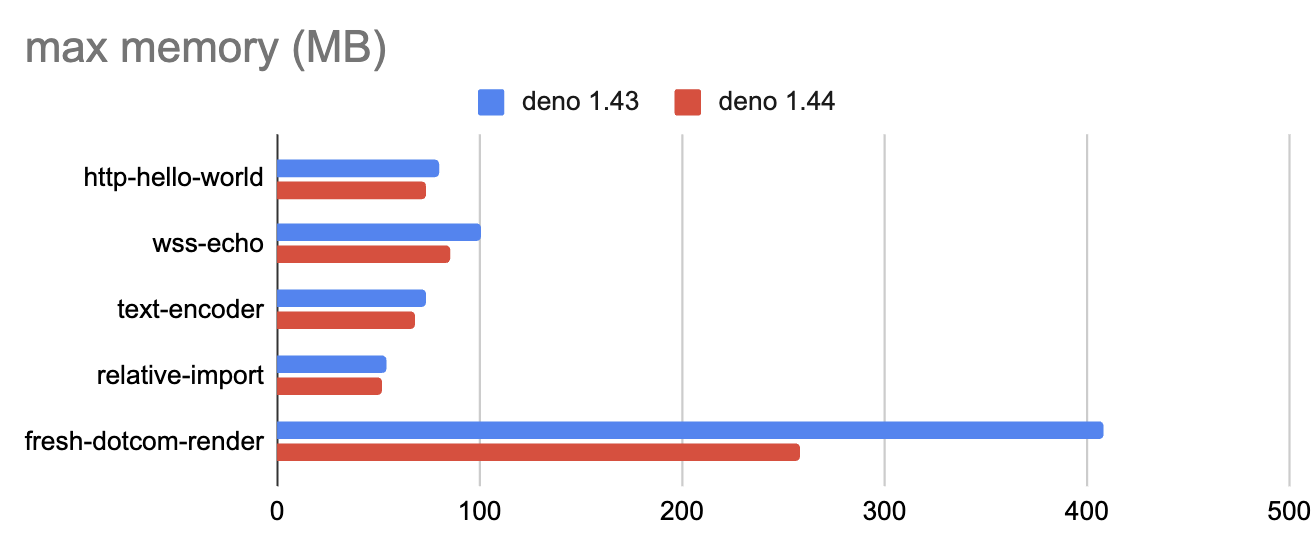Deno 1.44: Private npm registries, improved Node.js compat, and performance boosts
Deno 1.44 introduces support for private npm registries, enabling users to use
internal packages with Deno by configuring an .npmrc file. Additionally, Deno
1.44 now supports gRPC connections, enabling robust high performance
communication to services like Google Cloud Platform. This release also improves
Node.js compatibility, and re-enables V8 pointer compression for significant
performance gains. As usual, a bunch of other features and improvements are
included in this release to make your development experience even smoother.
To upgrade to Deno 1.44, run the following in your terminal:
deno upgradeIf Deno is not yet installed, run one of the following commands to install or learn how to install it here.
# Using Homebrew (macOS):
brew install deno
# Using Shell (macOS and Linux):
curl -fsSL https://deno.land/install.sh | sh
# Using PowerShell (Windows):
iwr https://deno.land/install.ps1 -useb | iexWhat’s New in Deno 1.44
- Support for private npm registries
- gRPC connections now supported
- Node.js compatibility improvements
- Performance improvements
- The Standard Library is moving closer to stabilization
Deno.exitCodeAPIRequest.bytes()andResponse.bytes()- Lint rules updates
- Clean coverage directory on test runs
- Print feedback for slow running tests
Deno.FsFilestabilizations- Changes in FFI API
- Pick a random port in
deno serve WebSockettimeout- Language server improvements
- Try out Deno 2 features with
DENO_FUTURE=1 - Acknowledgments
Support for private npm registries
Many large organizations host their own private npm registries to manage
internal packages. Deno 1.44 now supports using an .npmrc file to configure
Deno to fetch packages from this private registry. This feature is available
when using private packages in a package.json or when importing packages
directly using npm: specifiers.
// .npmrc
@mycompany:registry=http://mycompany.com:8111/
//mycompany.com:8111/:_auth=secretToken// deno.json
{
"imports": {
"@mycompany/package": "npm:@mycompany/[email protected]"
}
}// main.ts
import { hello } from "@mycompany/package";
console.log(hello());$ deno run main.ts
Hello world!You can also use private npm packages in your package.json file:
// package.json
{
"dependencies": {
"@mycompany/package": "1.0.0"
}
}// main.ts
import { hello } from "@mycompany/package";
console.log(hello());$ deno run main.ts
Hello world!gRPC connections now supported
Deno can now connect to gRPC services using the @grpc/grpc-js client library
from npm. This enables you to connect to gRPC services, such as Google Cloud
Platform from Deno. Here is an example using the Google Cloud Vision API via the
Google Cloud SDK to classify an image:
import { ImageAnnotatorClient } from "npm:@google-cloud/vision";
const client = new ImageAnnotatorClient();
const [result] = await client.labelDetection("./cat_dog.webp");
const labels = result.labelAnnotations;
console.log("Labels:");
for (const label of labels) {
console.log(" - ", label.description);
}gRPC is a high-performance, open-source, universal RPC framework that enables efficient communication between services. With gRPC support, you can build real-time, interactive applications that leverage the low-latency communication capabilities of gRPC.
Node.js compatibility improvements
This release marks a significant step forward in Deno’s compatibility with Node.js and npm packages.
As a major milestone, we have been able to run Next.js applications with Deno
with this release. While there are some rough edges, such as the need to use
DENO_FUTURE=1, we’re confident that we can work through these issues quickly.
We’ll publish a blog post soon with more details on how to run Next.js
applications with Deno.
For now, here is an example of running a Next.js application with Deno using the new Next.js server actions to stream a file:
Other Node.js compatibility improvements include:
- Add
Buffer.isUtf8()andBuffer.isAscii()whichts-noderelies upon. - Fix error when npm dependencies are bundled and passed
process.uptimearound. This error occured because our implementation relied onthisbeing correct. We’ve rewrittenprocess.uptimeto not rely on anythisreferences anymore. - Fix
SIG*listeners not being tracked inprocess.listeners. This fixes a bug where thesignal-exitpackage would not exit correctly. This package is used in many popular CLI tools likevitest. - Fix
tinypoolunable to terminateworker_threads. This was caused by us returning a different return code inWorker.terminate(). Thetinypoolpackage is used very heavily invitest. - Stub
AsyncResource.emitDestroy()fortinypoolto allow it to cleanly shut down workers. - Fix missing methods when passing
MessagePortto Nodeworker_threads. This addresses several errors related to worker communication invitest. - Allow the
Processclass to be instantiated without thenewkeyword. This addresses an issue withjest, the popular test runner. - Stub
perf_hooks.PerformaceObserverto get Next.js’buildcommand working. - Check if resource exists before attempting to close it. This makes GRPC’s deadline example work.
- Set up
node_modules/.binentries for packages with bin entry points. This was a long requested feature in relation to npm support. - Make parsing of incorrext
package.jsonfiles more robust. Some npm packages ship with apackage.jsonfile that doesn’t adhere to the expected data types. - Fix wrong exception thrown when calling
fs.rmSyncon a directory instead of a file. - Stub
findSourceMapforava - Fix default status code property not initialized with
200onServerResponse. This makes the11tydev server work. - Fix
geteuidmissing innode:process. - Fix stream not being marked as cancelled in gRPC. This makes the streaming example work.
- Fix wrong flag emitted upon emitting the
responseevent. This fixes error propagation in gRPC. - Allow
process.envvalues to be deleted via thedeletekeyword. This pattern is sometimes used in integrationt testing. - Use a separate module cache per
worker_thread. With that resolvedSvelteKitis working. - Fix a rare re-export bug with CommonJS that was discovered with the
@solana/spl-governancenpm package. - Fix
napi_get_elementandnapi_set_elementwhich makes npm DuckDB adapter work with Deno. - Make HOME directory detection more reliable for running server functions in OpenNext.
Additionally deno task got smarter when working with package.json files. If
it’s discovered that a task calls npm run <another_task>, Deno will use
deno task instead of running npm binary, see
#23036 for more details.
Performance improvements
Deno 1.44 introduces several performance improvements that make Deno faster and more memory efficient. We expect many projects to see memory usage reductions between 5-30%, depending on the workload.
Reduced memory usage with V8 pointer compression: Re-enabling V8 pointer compression allows V8 to store pointers more efficiently, greatly reducing memory usage. This enhancement is particularly beneficial for real-world scenarios with significant object allocations, leading to a notable reduction in memory consumption.

Faster module loading: Optimized module loading by performing tasks in parallel, including analyzing and emitting CommonJS exports and re-exports, compiling TypeScript to JavaScript during
deno cacheoperations, skipping unnecessary directory lookups during module resolution, and downloading metadata files as soon as possible. These enhancements significantly speed up module processing and caching efficiency, reducing overall startup times. These changes make projects with heavy use of dynamic imports around 2-3x quicker to start (#23856, #23894, #23892, #23851, #23836).Faster startup time in AWS Lambda: Using a Write-Ahead Logging (WAL) journal for SQLite databases in the DENO_DIR improves code caching and startup time for Deno instances, particularly beneficial in serverless environments like AWS Lambda. This change helps reduce the latency for cold starts, making serverless applications more responsive (#23955).
Improved language server performance: Caching semantic tokens for open documents in the LSP enhances language server performance, making development smoother and more efficient by reducing the time needed to re-analyze open files (#23799).
The Standard Library is moving closer to stabilization
The Deno Standard Library offers a set of high quality packages that are audited by the core team and guaranteed to work with Deno.
These days, the Standard Library is be published exclusively to
JSR under the @std scope. Existing
versions of the Standard Library will continue to live at https://deno.land/std.
This move, alongside Deno’s new workspaces functionality, is part of the changes
coming in Deno 2. For more details, check out
the Standard Library’s roadmap
for stabilization.
Deno.exitCode API
This release adds a new, stable Deno.exitCode API. You can use this API to get
and set the would-be exit code of your program:
console.log("Initial code", Deno.exitCode);
try {
console.log("Try to retrieve data...");
await fetch("https://doesnt.exist");
} catch (e) {
console.log("Failed to retrieve data");
// Set the exit code, to a special value to signal a failure.
Deno.exitCode = 42;
// Perform some additional cleanup...
}
console.log("Exit code after the task", Deno.exitCode);$ deno run --allow-net exit_code.ts
Initial code 0
Try to retrieve data...
Failed to retrieve data!
Exit code after the task 42
$ echo $?
42You can use this API to assign a particular exit code, but not exit immediately,
like when using Deno.exit(code?) API. This API allows to perform additional
cleanup before the program finishes.
This API is very similar to process.exitCode API from Node.js, however
Deno.exitCode has stronger validation and requires to set a valid decimal exit
code. Both APIs work in tandem and reflect values as expected:
import process from "node:process";
console.log("Deno 1 - exit code -", Deno.exitCode);
console.log("Node.js 1 - exit code -", process.exitCode);
Deno.exitCode = 42;
console.log("Deno 2 - exit code -", Deno.exitCode);
console.log("Node.js 2 - exit code -", process.exitCode);
process.exitCode = 70;
console.log("Deno 3 - exit code -", Deno.exitCode);
console.log("Node.js 3 - exit code -", process.exitCode);$ deno run exit_code.ts
Deno 1 - exit code - 0
Node.js 1 - exit code - 0
Deno 2 - exit code - 42
Node.js 2- exit code - 42
Deno 3 - exit code - 70
Node.js 3 - exit code - 70
$ echo $?
70Thanks to Luke Edwards for suggestion and initial implementation of this API.
Request#bytes() and Response#bytes()
The Fetch API specification was
updated recently with a new .bytes()-method on both the Request and
Response classes. This small change improves quality of life significantly
when working with bytes. You no longer have to get the underlying ArrayBuffer
and convert it to Uint8Array.
// Before:
const response = await fetch("https://example.com");
const buffer = new Uint8Array(await response.arrayBuffer());
// After
const response = await fetch("https://example.com");
const buffer = await response.bytes();Lint rules updates
This release brings a big update to an existing rule and a new lint rule.
no-undefined-vars
no-undefined-vars now works in JSX and TSX files:
import React from "react"; // This import is now flagged as unused!
const Foo = () => {
return "Hello world!";
};This improvement will be particularly useful for users of Fresh.
This rule is still enabled by default, like in previous releases.
no-boolean-literal-for-arguments
It is common to define functions that can take booleans as arguments. However,
passing boolean literals as parameters can lead to lack of context regarding
the role of the argument inside the function in question:
function redraw(allViews: boolean, inline: boolean) {
// redraw logic...
}
redraw(true, true);This rule enforces that all boolean parameters need to use “self-documenting” constants:
function redraw(allViews: boolean, inline: boolean) {
// redraw logic...
}
const ALL_VIEWS = true;
const INLINE = false;
redraw(ALL_VIEWS, INLINE);Thanks to Jorge Martin Juarez for implementing this rule.
This rule is disabled by default. You can enable it in your deno.json(c)
config file like so:
{
"lint": {
"rules": {
"include": ["no-boolean-literal-for-arguments"]
}
}
}Clean coverage directory on test runs
Deno’s built-in test runner received a new --clean flag which will empty the
coverage directory before running the test suite. This seems like a minor
change, but it solves the problem where coverage data for long deleted files was
still around.
deno test --coverage --cleanBe aware that this flag will cause conflicts when running multiple deno test
commands in parallel or in series, and then viewing the aggregated coverage
report. If you are running tests in parallel, you should not use the --clean
flag. If running in series, only pass the --clean flag to the first
deno test invocation.
Print feedback for slow running tests
We noticed that long running tests can cause confusion as to whether the test runner is still working when no output is shown:
$ deno test slow_test.ts
Check file:///tmp/test_slow.ts
running 1 test from test_slow.ts
test ...
'test' has been running for over 1m0s
'test' has been running for over 2m0s
ok (2m10s)
ok | 1 passed | 0 failed (2m10s)You can configure the interval of these messages using the
DENO_SLOW_TEST_TIMEOUT env var that accepts the number of seconds after which
the message is printed. We are considering adding a hard timeout to slow tests
that will forcefully abort the test. We’d love to hear your
feedback about this feature.
Deno.FsFile stabilizations
You no longer need to use the --unstable-fs flag, which frequently caused
issues in various contexts, including with frameworks like Next.js. The
following methods have been stabilized:
Deno.FsFile.syncData[Sync]()andDeno.FsFile.sync[Sync]()(#23733)Deno.FsFile.unlock[Sync]()andDeno.FsFile.lock[Sync]()(#23754)
These stabilizations remove the need for the unstable flag, making file system operations smoother and more reliable. By incorporating these changes, the API now supports essential file synchronization and locking capabilities directly within the stable Deno runtime. This enhancement is particularly useful for ensuring data integrity and handling concurrent file operations effectively.
Changes in FFI API
Deno’s FFI API allows you to call native libraries from JavaScript code. In Deno 1.44, we’ve made some changes to improve this functionality.
We have updated the handling of u64 and i64 types from native code.
Previously, these symbols were represented as number | bigint. Starting with
v1.44, they are always of type bigint. This change aligns the API with
JavaScript’s handling of large integers and ensures better performance and type
consistency. While this is a breaking change, the API remains unstable, and we
are using this opportunity to address type quirks as we move towards
stabilization of the Deno.dlopen() API.
(#23981,
#23983)
These updates are part of our ongoing efforts to stabilize the FFI API for Deno 2, ensuring it provides a robust and consistent experience for calling native libraries from Deno.
Pick a random port in deno serve
It’s been a month the deno serve command was added to Deno. It allows you to
write servers in a declarative way. We noticed that often during development you
want the server to start and don’t really care which port it will spawn on. For
that reason we’ve added support for passing --port 0, which returns a random
free port selected by your operating system.
$ deno serve --port 0 server.ts
deno serve: Listening on http://localhost:58333/WebSocket timeout
Deno has a ping/pong mechanism for WebSocket API that keeps connections
alive. Unfortunately the default timeout of 120s was too long for many popular
reverse-proxy servers like Nginx. Many of these servers have a default timeout
of 60s by default. This caused connections to Deno WebSocket servers to close
prematurely.
The default “idle” timeout for ping/pong messages was lowered to 30s. Most
WebSockets servers should be more reliable with this change, without any manual
intervention.
Thanks to Alex Gleason for implementing this change.
Language server improvements
This month we spent a good chunk of time cleaning up the language server which resulted in several performance improvements and bug fixes, namely:
- added caching for semantic tokens for open documents (#23799)
- reuse “sloppy imports” resolver (#23764)
- apply import fix to missing declaration code action (#23924)
- fix JSDoc display in named examples (#23927)
- show reference CodeLens for methods (#23804)
Try out Deno 2 features with DENO_FUTURE=1
We continue to ship changes that will take effect in Deno 2, that you can try
today by running Deno with DENO_FUTURE=1 environment variable.
This release brings following changes:
deno installnow handles adding dependencies todeno.json(c)andpackage.jsonfiles, making migration of Node.js projects much easier.- All file system APIs are stable (
--unstable-fsflag is not needed) - WebGPU API is stable (
--unstable-webgpuflag is not needed) - FFI API is stable (
--unstable-ffiflag is not needed) deno installproperly sets upnode_modules/.bin/entries fornpmpackages with binary entrypoints
Acknowledgments
We couldn’t build Deno without the help of our community! Whether by answering questions in our community Discord server or reporting bugs, we are incredibly grateful for your support. In particular, we’d like to thank the following people for their contributions to Deno 1.44: Alex Gleason, Antoine du Hamel, Bedis Nbiba, charlotte ✨, chirsz, Evan, Felipe Baltor, futsuuu, Hajime-san, Hasan-Alrimawi, Kenta Moriuchi, Kyle Kelley, Luke Edwards, Mathias Lafeldt, Mattias Buelens, Mike Mulchrone, Milly, Simon Lecoq, Volker Schlecht.
Would you like to join the ranks of Deno contributors? Check out our contribution docs here, and we’ll see you on the list next time.
Believe it or not, the changes listed above still don’t tell you everything that got better in 1.44. You can view the full list of pull requests merged in Deno 1.44 on GitHub here.
Thank you for catching up with our 1.44 release, and we hope you love building with Deno!
🍋 Fresh 2.0 is right around the corner.
Our next major Fresh release will be simpler with a more composable, routing API. Read more here.


